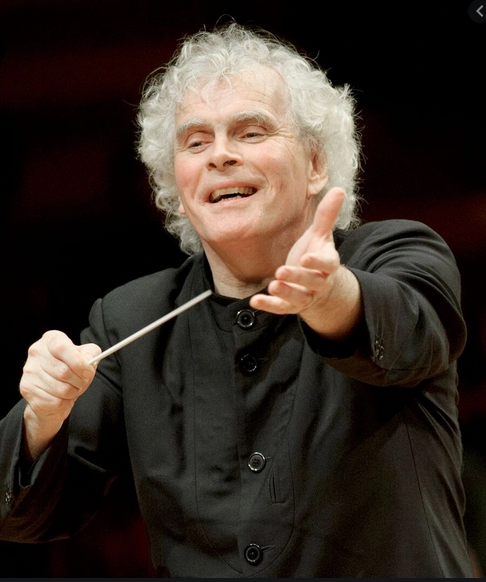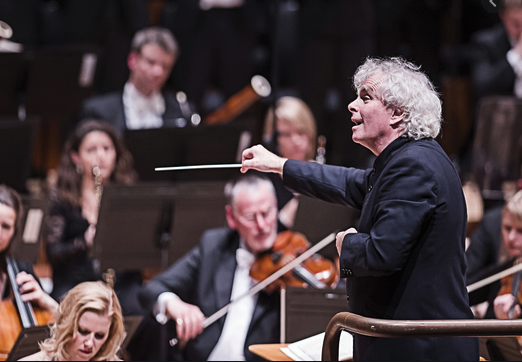Less than two weeks into our post-Brexit world, the news came this week that Sir Simon Rattle — arguably Britain’s pre-eminent classical music conductor, who previously led the City of Birmingham Symphony Orchestra through the entirety of the eighties and most of the nineties — is to give up his current post as music director of the London Symphony Orchestra to return to Germany, where from 2002 to 2018 he was the principal conductor of the Berlin Philharmonic, to now work for the Bavarian Radio Symphony Orchestra in Munich.

He has, at least, agreed to extend his five-year contract with the LSO that he joined in 2017 by an additional year, through to 2023. At the time his return to the UK was announced in 2015, Nick Clark (then writing for The Independent) reported of the accomplishment of getting him back on British soil, with the LSO’s managing director Kathryn McDowell commenting, “It’s wonderful to be bringing Simon back to Britain. He is the embodiment of the 21st-century music director”.” And the LSO’s chairman, Lennox Mackenzie, commented that his appointment was the latest in “successive generations of great musical leaders from Sir Edward Elgar to André Previn and Sir Colin Davis to Valery Gergiev”.
Rattle himself is quoted saying, “The idea of coming home and actually having a position in this fantastic city, which I never had, is a thrill to me,” and he called this his “last big job.” Part of the reported lure at the time was the prospect that was dangled of a brand-new concert hall being created in the City of London for the LSO, the Centre for Music (architectural drawing by the New York firm Diller Scofido + Renfro is pictured below of the project, reported to be budgeted at £288m).

As Charlotte Higgins reported in The Guardian on Wednesday, it was backed by the then-chancellor, George Osborne, who’d seen the point of the project after “speaking to the likes of Sir Simon Russell. “These were exciting, optimistic times. ‘This has all moved so fast, it’s like going down Niagara Falls in a barrel,’ Rattle told reporters at the time. He would, it was said, be at the centre of an architectural project as culturally transformative as Tate Modern.”
But as Higgins goes on to say, “That barrel got stuck. Although glamorous plans were unveiled in 2019, the new hall is looking more and more like a fantasy. And now it is losing Rattle, its champion: it’s a kick in the teeth for London, a negation of that proud homecoming…It turns out that running the LSO is not so much Rattle’s ‘last big job’ as his second-last big job.”
Rattle has said that his decision to leave was motivated largely by personal reasons, namely that his Czech wife and their three children are based in Berlin. Higgins, however, offers an interesting wider perspective:
“The concert hall feels like a pre-Brexit, pre-Covid project, one conceived when Osborne and David Cameron were entertaining fantasies about London’s future as an ever-expanding, ever-shinier global and European financial hub. But the plan always exemplified the capital’s dislocation from the rest of the UK. It looked decadent to an austerity-hit world beyond the M25, rather like the way that Crossrail looks enraging to anyone attempting to commute by train to more or less any other British city. Then there is the big European rupture. In 2017, Rattle told the Guardian that he would have been ‘extraordinary wary’ of taking the LSO job if he’d known Brexit was on the way.”
And yet here we are, living in a post-Brexit world already, and finding out that far from promoting Project Fear, people who warned about the consequences of Brexit were dead right. Project Here is proving to be a predicted and predictable story of failed promises and negotiations done in bad faith that emerged also this week.
As Ivan Hewett, classical music critic for the Telegraph, wrote this week,
“The LSO, like every other orchestra in the UK, is now on its knees. It makes 78 per cent of its income from box office and other earnings, nearly all of which has vanished since mid-March. And further this departure comes at a rocky moment in London’s orchestral life more broadly, with a coming changeover of chief conductor at three of London’s orchestras: the London Philharmonic, the Royal Philharmonic, and the Philharmonia. And then there’s the other issue that it’s fair to assume is top of Rattle’s mind: Brexit. Rattle has made no secret of the fact that he is appalled and baffled by our separation from the European Union. “I wonder who could do justice to it,” he said with a gesture of helplessness, when I once asked him about it. “Would it be Lewis Carroll, Joe Orton, Salvador Dali? I mean … it’s beyond surreal.” It’s not implausible to imagine Rattle discovering belatedly that he was more European than he realised.”
It may be strange to see someone writing in the Telegraph — owned by the Brexit-championing Barclay brothers, one of whom coincidentally died this week — admitting, “It is indeed inarguable that international travel for musicians has become more difficult than it was when we were part of the Union, with increased red tape, including requirements around the transfer of musical instruments across borders.”
But then he says,
“Yet the complexities of Brexit and the disaster of Covid are precisely the reasons why Rattle should stay in this country. At this point in time the actions of a figurehead such as Rattle – take on huge symbolic significance. He may not intend his departure as an abandonment but that’s inevitably how it feels.”
It might have been more honest, instead of accusing Rattle of a kind of betrayal, he might have said: “This is our mess, but you’ve got to lie in it” (the lie being in every sense). It’s the same weapons-grade hypocrisy that American Republican senators are using against Democrats arguing trying to censure Donald Trump for openly inciting his rabid followers (or “basket of deplorables”, as it turns out that Hillary Clinton was right to call them back in 2016) to carry out their attack and attempted coup on the Capitol last week: now those very same senators who for years have been silent as their President sowed dissent and division on a daily basis are now asking for Joe Biden to try to unite the country that Trump so mortally damaged.
Meanwhile, Boris Johnson and Priti Patel continue to try to lie themselves out of a paper bag. Earlier this week, the UK government publicly denied a story in the Independent that the UK had dismissed an exemption for British performers and musicians travelling to Europe, because it did not want to have to offer reciprocal benefits for UK artists working in the UK.
A DCMS spokeswoman is quoted in The Stage saying,
“This story is incorrect and includes misleading speculation from anonymous EU sources. The UK pushed for a more ambitious agreement with the EU on the temporary movement of business travellers, which would have covered musicians and others, but our proposals were rejected by the EU.”
But by the end of the week, Rob Merrick — deputy political editor of The Independent — reported another U-turn on the facts:
“No 10 has admitted an EU proposal to allow visa-free tours by musicians was rejected, apparently because of a belief it clashed with ending free movement. After days of arguing Brussels threw out a deal, the government has acknowledged it did turn down a plan – but has refused to explain the reasons for doing so.”
As Merrick adds,
“Music organisations said the admission made it even more important that ministers come clean about what happened in the negotiations – and find a solution, to lift the threat of musicians requiring work permits. They had been repeatedly reassured that a Brexit deal would protect touring performers, as well as their support teams and equipment, in an industry worth £5.8bn a year to the UK economy.”
So once again Boris Johnson, Michael Gove and Priti Patel’s empty promises and blatant lying has been exposed for what it is.
But at the same time, perhaps the opportunity to take stock and pause, regarding that proposed new London concert hall on the site of the current home of the Museum of London, is no bad thing. As Higgins concludes in The Guardian,
“The rhetoric that London, by sole virtue of being London, deserves a ‘world-class concert hall’ never seemed convincing. If Birmingham, or Gateshead, or Manchester have better halls than the capital, that is surely a good thing. The visionary architect Cedric Price once told a client to consider the idea that building a house wasn’t necessarily the answer to his problems. Perhaps, he suggested, the client would be better off getting a divorce. ‘Build a new concert hall in London’ feels like the wrong answer to pretty much any question at the moment. Perhaps Rattle has it right: a quieter and more modest existence, one that’s more sustainable and less frenetic, is what London needs – and what it will probably get, like it or not.”

